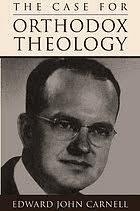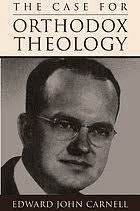Why “Orthodox” Rather than “Conservative”
Note: If you post a comment here, make sure it is relatively brief (no more than 100 words), on topic, addressed to me, civil and respectful (not hostile or argumentative), and devoid of links or photos.
Recently here I stated that I am neither conservative nor non-conservative theologically. (The headline of a review my recent book “Against Liberal Theology” in “Christianity Today” labeled me “non-conservative.”)
I said in that blog essay that I prefer to be labeled “orthodox” and I will add “evangelical.” Call me an “orthodox evangelical” meaning, not liberal, not fundamentalist, not conservative among evangelicals. Among American evangelicals “conservative” tends to mean adhering to biblical inerrancy and plenary verbal inspiration and an overly literalistic interpretation of the Bible.
After writing that blog essay, it occurred to me that I am in good company.
When Fuller Seminary president E. J. Carnell was asked to write a book entitled “The Case for Conservative Theology” he demurred and instead insisted on the title “The Case for Orthodox Theology.” This was his contribution to a three volume set. The other volumes were “The Case for Theology in Liberal Perspective” by L. Harold DeWolf and “The Case for a New Reformation Theology” by William Hordern. (Hordern’s book was originally intended to be titled “The Case for Neo-Orthodox Theology” but, like Carnell, he wanted a different title and got it.) All three volumes were published by Westminster Press.
In “The Case for Orthodox Theology” Carnell, then a leading evangelical theologian, stated that “conservative” is often equated with “fundamentalist” and fundamentalism is “orthodoxy gone cultic.” He preferred to be called “orthodox” rather than “conservative” even though he admitted to being conservative compared with liberals and even neo-orthodox.
Carnell’s book was published at a time when Fuller Seminary was under attack for allegedly waffling on “biblical inerrancy.” Being “conservative” among American evangelicals was becoming synonymous with being almost fundamentalist if not fundamentalist. Carnell, like Bernard Ramm and other leading evangelical thinkers, did not want to be considered part of the almost fundamentalist evangelical crowd that was putting tremendous pressure on Fuller Seminary.
I’m surprised that CT would label me “non-conservative” as I have never called myself that. I have called myself “postconservative” but always explaining that does not mean non-conservative or anti-conservative. It means wanting to transcend the elements of fundamentalism that remain within and among American conservative evangelicals such as (IMHO) The Gospel Coalition. It means wanting to keep the constructive task of theology open, not guided by culture but by fresh and faithful interpretation of the Bible. I explained all this very clearly in “How to Be Evangelical without Being Conservative.” I suppose the title of that book justifies CT calling me “non-conservative.” If so, then I claim Carnell as my model.
*Footnote: I was a consulting editor and then contributing editor of CT for many years and wrote many articles that were published in the magazine. I was close with editor David Neff and executive editor George Brushaber. Then, a few years ago, CT dropped me from the masthead without explanation. Mark Galli was editor at that time. When I asked him why, he simply said it was to bring new people on board. If I was replaced by Scot McKnight, then it was a good change. I have nothing but respect for Scot. But I still don’t quite understand why we couldn’t both be contributing editors.*














